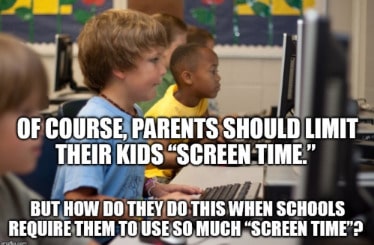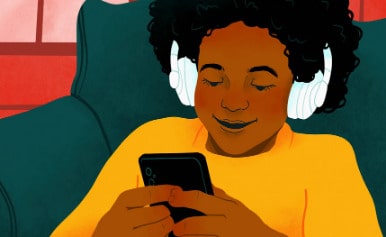
Excess blue light exposure from screens can trigger early puberty in children
ROME, Italy — Smartphones and tablets are causing early puberty in children, according to new research. Researchers say the devices emit blue light which reduces melatonin, a hormone that slows sexual maturity.
The scientists add that kids should not use digital devices before bed. Humans secrete the chemical at night, in response to darkness.
The study reports that blue light-emitting devices also fuel reproductive hormones and trigger physical changes in ovaries. Worryingly, they may even trigger infertility. “In the last 10 years, blue light (BL) sources such as tablets and phones has increased in every age group,” the researchers write in their study. “Especially due to the COVID-19 pandemic, screen exposure has also increased in childhood.”
The results have implications for a phenomenon that has been baffling pediatricians for years. On average, girls begin puberty around the age of 11 and boys 12. However, there are signs they are undergoing the change a year or more sooner than decades ago. Some girls are even developing breasts at age six or seven. Obesity, chemicals and stress have been the main culprits.
Experiments show that long periods of exposure to blue light speeds up puberty in female rats. The time-point is roughly equivalent, relative to life expectancy. Hormonal and ovulation changes during pre-puberty and puberty are also comparable. The findings, presented at the 60th annual meeting of the European Society for Pediatric Endocrinology, are likely to apply to humans. They could affect childhood development and future fertility.
Study authors are calling for further investigations. “We have found that blue light exposure, sufficient to alter melatonin levels, is also able to alter reproductive hormone levels and cause earlier puberty onset in our rat model. In addition, the longer the exposure, the earlier the onset,” Dr. Uğurlu says.
‘Study is the first to show effects of blue light exposure on puberty’
Screen time is already known to disrupt sleep in children and adults. It affects the body clock by inhibiting the evening rise in melatonin. The hormone prepares us for rest and sleep. Levels are higher before puberty, delaying its start.
Puberty is a complex process that involves coordination of several body systems and hormones, Dr. Uğurlu says. Several recent studies have reported early onset for girls, particularly during the pandemic.
The link between blue light and reduced melatonin suggests increased screen time are playing a role in the reported increase, the study authors say.
Dr. Uğurlu and colleagues divided immature 21-day-old lab animals into three groups of six, exposing them to a normal light cycle or six or 12 hours of blue light. The first signs of puberty occurred significantly sooner in the blue light group. The longer the duration, the earlier the onset. They also had less melatonin and elevated levels of estradiol and luteinizing hormone (LH). The former thickens the womb and breasts while the latter spurs ovulation.
Full article: Researchers Advise Limiting Kids Exposure to Blue Light from Screens due to “hormone-altering effects”


